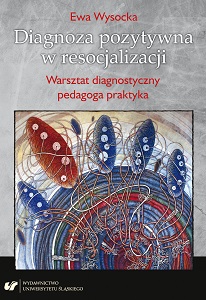Diagnoza pozytywna w resocjalizacji. Warsztat diagnostyczny pedagoga praktyka
Positive diagnosis in resocialization. Diagnostic workshop of a practicing pedagogue
Author(s): Ewa Wysocka
Subject(s): Social Sciences, Education
Published by: Wydawnictwo Uniwersytetu Śląskiego
Summary/Abstract: The present publication constitutes a theoretical, methodological and practical suggestion of an approach to resocializing diagnosis in a positive perspective. Departing from the theoretical tenets of positive diagnosis in resocialization and the established model of methodological cognition of a socially maladjusted individual, the author suggests a particular diagnostic workshop, possible to be employed in positive resocialization (creative, based on a salutogenetic model). This forms a basis for projecting resocializaing activities, which directly and primarily refer to the individual’s potential (creative resocialization; creative actions), and only additionally to its developmental deficits (resocialization in the traditional, pathogenetic perspective; corrective actions.)The publication constitutes a continuation of the monograph concerning positive diagnosis in resocialization, which was published in 2015 (Positive Diagnosis in Resocialization. A Theoretical and Methodological Model, University of Silesia Press). In both publications, the author undertook the challenge of creating a new theoretical and methodological model of diagnosis for the purpose of resocialization, as her starting point adopting particular anthropological premises concerning the nature of the human being, its development, upbringing and resocialization. Through the criticism of these premises, she adopted the model of “becoming” of an individual, typical to the humanistic, transgressive and, at the same time, personalizing approach. The fundamental premise here is the treatment of the developing individual as a “becoming” subject, a complex, multidimensional and integrated (bio-psycho-sociological, cultural and spiritual) entity, which always undertakes both adaptive and transgressive actions. This directly necessitates the acknowledgement of individualistic paradigm on every level of influence (diagnostic, methodological and social), and relating to that paradigm, which is particularly difficult in resocialization. In the subjective perspective upon an individual, it is assumed that it constitutes a developing subject, which is self-aware and reflexively “becoming,” and makes choices according to its own, self-discovered potential. The external influence and the pedagogic relation, though undoubtedly important, are only to support this development.The book is composed of two chapters. The first one is a recapitulation of the theoretical and methodological assumptions of a positive diagnosis in resocialization, enhanced with motifs unaddressed by the previous publication. The second chapter – in accordance with the adopted assumptions – contains the suggestions of particular models of diagnosis of the human qualities and potentials, which must be identified and utilized in the process of internal change or the process of supporting the individual’s development.The first chapter presents the critique of the anthropological approaches to the nature of the human being, its becoming, upbringing and resocialization (pedagogical engineering, permissivism in upbringing, pedagogical personalism). The cognitive model is grounded within a positive approach, typical to a humanistic and transgressive approach.The second chapter is more practical in character, but it accentuates the methodological grounds for the presented models of diagnosis (the principles and procedures for creating diagnostic tools): a) personality in the cognitive approach mainly, b) creative potential of an individual, which directly dictates the nature of the process of “becoming” of a human being.The particular methodological and practical value of the publication resides in the presentation of diagnosis of concrete cases through the use of selected theoretical and methodological models (and the diagnostic tools constructed on their basis). These cases may simultaneously serve as examples of formulating diagnosis (diagnostic descriptions and interpretations) performed on the grounds of other diagnostic tools, characterized in the publication in lesser detail.The presented theoretical and methodological positive approach to diagnosis for the purpose of resocialization, together with its exemplification and concretization in the form of model solutions in the area of diagnostic conduct, appears essential for the development of theoretical, methodological and diagnostic awareness amongst both theoreticians and practitioners of education and re-education. The positive approach in resocialization necessitates an interdisciplinary treatment of the subject of diagnosis (the qualities and features of an individual), which results from the complex, multidimensional and integrated nature of the human individual, and from the complexity of the mechanisms of the process of becoming and internal change. The cognitive concept of a human being is accentuated here. It integrates the model of cognition and individualizes its process, relating it to the main mechanism of “becoming,” which is the way in which the individual being perceives itself and the world in which it develops.The primary paradigm in the positive approach to the resocializing diagnosis suggested by the author is thus constituted by the assumptions of positive and transgressive psychology, the ideas of salutogenesis and resilience. They form the basis for positive resocialization, which, in turn, necessitates the focus on selfcreation and creative resocialization, relating to the identified and particular potentials of an individual (positive diagnosis).
Series: Nauki społeczne
- Print-ISBN-10: 978-83-226-34
- Page Count: 388
- Publication Year: 2019
- Language: Polish
- eBook-PDF
- Table of Content
- Introduction

